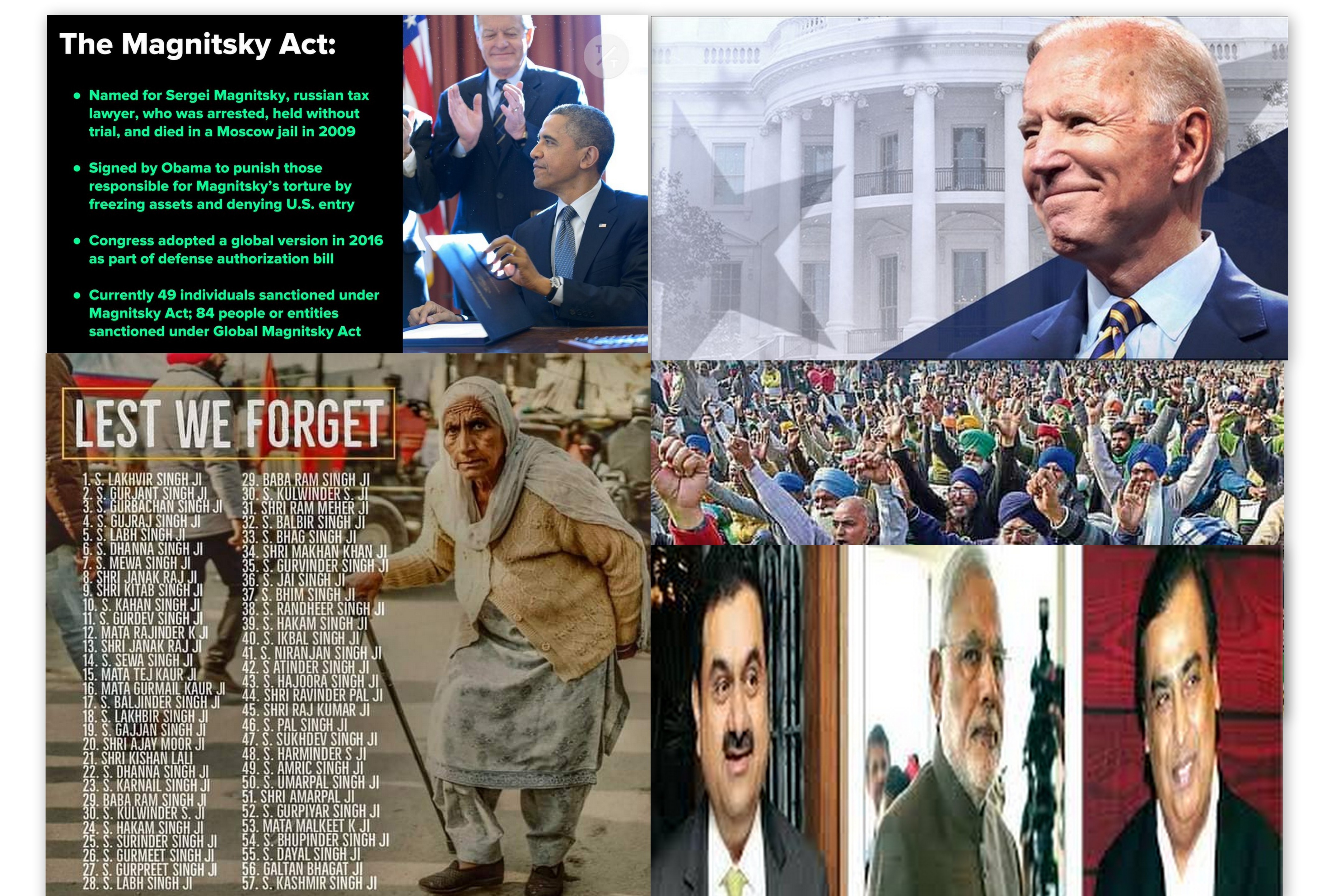An official source in the administration team of President elect-Joe Biden, on the condition of anonymity, revealed that there is a strong possibility of US sanctions on the two corporate houses of Ambani and Adani in India, in the context of the farmers’ protests. The sanctions, if imposed will be placed under the Magnitsky Act of 2012 passed & implemented by Barrack Obama. The Magnitsky Act guides the US administration to take into account the human rights-violations in countries with which the US has trade relations. This may result in Ambani and Adani groups facing Economic and Financial sanctions from US, resulting in freezing of the assets of the corporations, and their money in foreign banks, locking out the access.
Also read: Trends in Foreign Policy of US
The standoff between the Indian government and farmers has been inconclusive after repeated talks. The protests have drawn media attention across the world including in the US, Australia, and the EU. The farmers had ruled out the apex court’s decision to constitute a four-member committee. They had asserted that the panel members had opinions and views in the favour of the farm laws. After this, Bhupinder Singh Mann, leader of BKU (Mann) had removed himself from the panel, taking side with the farmers. The truth behind the ongoing protests which have continued for more than 50 days up till today, when the ninth round of talks has also failed, lies in the top two corporate houses of India.
According to several international media reports and reliable sources, it was revealed that Adani Agri Logistics Ltd (Owned by Gautam Adani, India’s second-richest person) had incorporated a number of agriculture-oriented companies since 2019. It is surprising how Adani and Ambani were well aware of the farm laws before those were tabled in the Indian Parliament. The laws were passed in a parliament with minimal quorum using the pretext of the Covid19 pandemic, and with no Question hour.
Nevertheless, the Adani group also constructed a silo with a capacity of 200,000 metric tons in the Moga district of Punjab, which is currently providing a food storage facility to the Food Corporation of India (FCI). Lining up another high capacity silo, the Adani group has purchased land in Faridkot district to construct and develop a high volume storage facility there.
Similarly, India’s richest person, Mukesh Ambani, openly denounced his involvement in the agriculture sector. In fact, after making such a statement, Ambani owned Reliance Retail Limited officially stated to purchase over 1,000 quintals of Sona Masoori Paddy from farmers in Raichur of Karnataka state for a price more than MSP (Minimum Support Price), which is considered as a deliberate action to lure farmers into the trap. There is no doubt that new farm reform-laws were tabled to support ‘Corporate houses’ and not the farmers, clearly visible in the glaring loopholes, which include an indirect threat to the rights of the farmers to their lands, in the laws passed in September, last year.
There were significant violations of global Human Rights from the authorities during the agitations of protesting farmers’ march towards national capital, which is termed as “Rebellion against tyranny and oppression.”
Chief Minister Manohar Lal Khattar of BJP, directed Haryana police to use force and Haryana police used water cannons, tear gas to halt the protest from reaching the national capital, which violates article 3, 5, and 13 of the Human Rights declaration (Article 3 deals with the Right to life, liberty and the security of person., Article 5 deals with Degrading Treatment, and Article 13 deals with Right to Freedom of Movement).
Majority of Indian media-houses which show unabashed allegiance, without questioning, to the government (and employ jingoistic anchors and reporters who bootlick the government) has made a third violation of the Human rights declaration by labeling farmers as terrorists. Article 12 of the Universal Declaration of human rights states that “no one shall be subjected to arbitrary interference with his privacy, family, home, or correspondence, nor to attack upon his honour and reputation”. Another primary concern in the protests was the passing away of 60 people, who died during the agitation at the Delhi-border due to the harsh cold, with a few committing suicides.
In this regard, the interference from the Supreme Court of India has come as a ray of hope, when it stayed the implementation of the three farm-laws. Even this development had come after a long time of the court showing mostly indifferent attitude towards the protests. The Apex court had set up a committee of four people to look into the issues of the farmers, out of which three are known to be holding views favouring the farm-laws.
Lanny J Davis, a Senior Lawyer & Political Analyst in US, had recently published an article with regards to the current situation of the farmers’ protests, where he compared this action of GOI with the policy actions taken by the Margaret Thatcher in UK in the deregulation in 1980s.
Lanny Davis, who had been a special counsel to Bill Clinton, observed in the context of the possible sanctions against Ambanis and Adanis, that Biden may also go for smart sanctions under various US laws guiding trade relations. These sanctions would be designed to penalize individual corporations who are likely behind the GOI in pressing for the farm laws for their own benefits and to the detriment of the farmers. The Magnitsky Act of 2012 is designed to punish specific unethical officials working for the benefits of few corporations, adding harm to the human rights of groups, like farmers in this case.
This development comes as the farmers’ protests have grown to be one of the largest protest movements in history, which has received support from UN chairperson Antonio Guterres and the Canadian PM Justin Trudeau.





